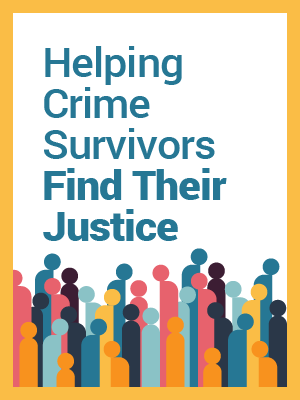Archival Notice
This is an archive page that is no longer being updated. It may contain outdated information and links may no longer function as originally intended.
Training and Technical Assistance
OVC encourages service providers and allied professionals to strengthen their knowledge, skills, and abilities to provide the best possible services to crime victims throughout the Nation. The OVC Training and Technical Assistance Center (OVC TTAC) leads the agency’s efforts to provide expertise- and capacity-building activities by offering a variety of instructor-led, in-person, and online trainings and tools, including the Victim Assistance Training Online (VAT Online) series.
OVC TTAC also provides educational opportunities through the National Victim Assistance Academy and awards scholarships to eligible professionals and survivors to attend training conferences. Further, OVC TTAC developed key resources for specific populations of crime victims, as well as victims who may have additional needs, to help organizations better serve these populations. It provides training and technical assistance (TTA) and speaker support for events tailored to the needs of specific service providers and maintains a comprehensive network of consultants with the expertise to inform OVC’s capacity-building initiatives.
In FYs 2021 and 2022, OVC TTAC provided 481 in-depth TTA activities to organizations and served more than 2.69 million individuals in areas of victim services, including human trafficking, terrorism, mass violence, and law enforcement. OVC supported specialized TTA in other critical areas, including vicarious trauma and trauma-informed practices. Some of these activities are discussed further in other parts of this report.
Supporting First Responders to Mass Violence
OVC TTAC deploys expert consultants to affected communities to help them assess victims’ needs, coordinate victim services, identify resources and gaps in services, and develop strategies for victim service providers—including first responders and others who assist victims—to develop victim needs assessments and draft applications for grant funding through the OVC Antiterrorism and Emergency Assistance Program. OVC TTAC provided consultant support to 13 communities affected by mass violence in FY 2021 and 15 communities in FY 2022.
It also supported 53 mass violence training and intensive technical assistance activities for 1,110 participants in FY 2021 and 65 activities for 1,958 participants in FY 2022. This assistance included statewide conference presentations and reviewing and providing technical assistance on mass violence victim assistance plans. In addition, OVC TTAC presented six webinars that emphasized significant actions to help communities prepare for and respond to a mass violence incident:
- Helping Victims of Mass Violence and Terrorism: How To Design and Implement a Community Resiliency Center (June 28 and June 30, 2021)
- Expert Q&A – Are You Prepared? The Role of Victim Assistance Providers in Preparing and Responding to Incidents of Mass Violence (September 29, 2021)
- Helping Victims of Mass Violence and Terrorism: How to Design and Implement a Hospitality Center (March 8 and March 10, 2022)
- Psychological First Aid and Victim Assistance (July 26, 2022)
Each webinar averaged more than 200 participants.
Supporting Partnerships To Address Domestic Violence
In FY 2018, OVC provided funding to the Domestic Violence Housing Technical Assistance Consortium—a collaboration between OVC, the U.S. Department of Health and Human Services, U.S. Department of Housing and Urban Development, and the Office on Violence Against Women—for technical assistance and resource development. This federal partnership provides national support and encouragement to assist grantees and subgrantees in implementing trauma-informed housing programs by building meaningful partnerships with local domestic and sexual violence programs, state domestic and sexual violence coalitions, and housing service providers.
Since the launch, the consortium—now referred to as the Safe Housing Partnerships Technical Assistance Consortium—has initiated and conducted a series of trainings and technical assistance engagements to address the evolving needs of our communities. The team partners were very responsive to the onset of the pandemic, quickly collaborating to develop a series of online trainings to support the field in responding to the public health crisis and the resulting housing demands, changed economic landscape, and dramatically increased needs among survivors.
More recently, the consortium has focused efforts on centering racial equity into their work. Black people, Indigenous people, and other persons of color are overrepresented in homeless populations due to structural racism, historical measures, network impoverishment, and other racial disparities across systems. Team partners are working on updating their racial equity action plan and working together to identify culturally specific programs across the country to identify their needs and build resources to support them in serving these specific populations. Significant attention has also been given to recent research on the domestic violence housing first model and flexible financial assistance which has contributed positively to housing stability for survivors over time.
VictimLaw
OVC TTAC supports VictimLaw, a free, searchable database of more than 35,000 victims’ rights laws, including federal, state, and territorial statutes; Tribal laws; state constitutional amendments; court rulings; administrative proceedings; case summaries; and Attorney General opinions. The VictimLaw database was accessed by 7,445 users in FY 2021 and 5,865 users in FY 2022.
Understanding Human Trafficking
Launched in FY 2020, the Understanding Human Trafficking online training offers foundational learning on trauma-informed and victim-centered approaches to human trafficking. The modules are designed to benefit a wide audience, including victim service providers, first responders, government organizations, teachers, students, and members of the public. As of April 2023, individuals had registered for 47,664 courses, of which 37,248 had been completed.




